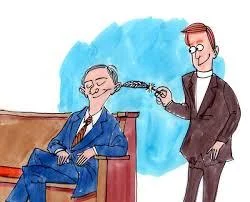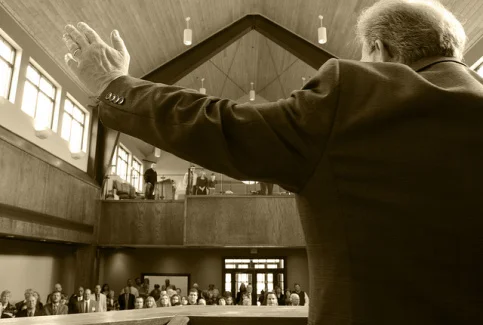This is part 1 of a point by point response to a sermon a convert to Eastern Orthodoxy recommended to me preached by the late Fr. Thomas Hopko which is accessible here: https://www.ancientfaith.com/specials/hopko_lectures/understanding_the_cross_of_christ
Here is the article from the Christian Research Institute’s website I refer to:
https://www.equip.org/broadcast/body-christ-denominations-qa/
The following is from Chapter 53 of “The Bible Answer Book” by Hank Hanegraaff:
– 53 –
DOES JAMES TEACH SALVATION BY WORKS? Critics of the Bible have long argued that the book of James contradicts the rest of Scripture in teaching “that a person is C justified by what he does and not by faith alone” (James 2: 24). Upon closer examination, however, the book of James, like the rest of Scripture, confirms that we are saved not by what we do but by what Jesus Christ has done. First, in context James teaches that we are saved not by works but by the kind of faith that produces good works. As James puts it, “What good is it, my brothers, if a man claims to have faith but has no deeds? Can such faith save him?” (2: 14). The answer is “no.” “As the body without the spirit is dead, so faith without deeds is dead” (v. 26). Furthermore, when James says a person is not justified by faith alone, he means that a person is not justified by mental assent alone. As such, he says, “Show me your faith without deeds, and I will show you my faith by what I do. You believe that there is one God. Good! Even the demons believe that––and shudder” (vv. 18–19). In other words, demons believe in the sense of giving mental assent to the fact that there is only one true God, all the while failing to place their hope and trust in him. “Justification is by faith alone, but not by a faith that is alone.” Finally, while James says “a person is justified by what he does and not by faith alone” and Paul says “man is justified by faith apart from observing the law” (Romans 3: 28), their words are in complete harmony. James is countering the false assertion that a said faith is a substitute for a saving faith, while Paul is countering the equally fallacious notion that salvation can be earned by observing the law. As the Reformers were wont to say, “Justification is by faith alone, but not by a faith that is alone.”
For further study, see R. C. Sproul, Justified by Faith Alone (Wheaton, IL: Crossway Books, 1999).
“Was not our ancestor Abraham considered righteousfor what he did when he offered his son Isaacon the altar? You see that his faith and his actionswere working together, and his faithwas made complete by what he did.” JAMES 2: 21–22
Hanegraaff, Hank. The Complete Bible Answer Book: Collector's Edition (Kindle Locations 1798-1820). Thomas Nelson. Kindle Edition.
I wonder if Hank Hanegraaff would continue to recommend R. C. Sproul’s excellent book: “Justified by Faith Alone” today. Clearly, he would not. Why? Because his view on the heart of the gospel has, in point of fact, changed.
To the detriment of generations of believers, children have been sent out of the worship services of Christ’s church into the unbiblical phenomenon of “children’s church” for far too long. It is time to abolish this unbiblical practice and bring the covenant children of Christ’s church back into the service that they may learn from the older and wiser parents and saints what it means to truly worship God in Spirit and in truth from their youngest ages!
My former denomination published and excellent resolution regarding a “final salvation” or “final justification” by the fruits of our faith. Please read!
Here is a YouTube channel of some of the main Revoice conference talks. Evidently, not all of the break-out sessions were recorded or posted anywhere:
In this sermon, I address the issue of addition to Scripture, subtraction from Scripture, deduction from Scripture with regard to the “elements” of worship, and the use of prudence and wisdom regarding the “circumstances” of worship.
The "elements" of a worship service are: prayer, bible reading, preaching, singing, sacraments, and on special occasions taking oaths. These are what God requires us always to do. These are regulated by Scripture alone.
The "circumstances" of a worship service are: a building (or location), a pulpit, pews, air conditioning, the time of the service, etc. These are regulated by Christian prudence and the application of biblical wisdom.
Two books mentioned in this sermon:
What is it that God, our Creator and Redeemer, desires His gathered church to do when they gather for worship on the Lord’s Day Sabbath? Are Christians free to do whatever they like? Why does so much of what’s left of conservative Christianity in the United States look more like a rock concert than a service of worship to the Living God? Make sure your children understand this precious truth as it will be vital for them to know when/if they have to choose a local church on their own at some point in their future!
Tabular Comparison of Westminster Confession and the 1689 London Baptist Confession: https://www.proginosko.com/docs/wcf_lbcf.html
===> Notice in chapter 7, the LBC deletes the definition of the covenant of works, point 2. The LBC uses the phrase "covenant of works" in several other places, but it is not defined anywhere.
===> Another anomaly in the LBC is its practical deletion of the entire chapter of the Westminster Confession on Sacraments. “Chapter XXVII: Of the Sacraments” is a robust chapter with vitally important biblical theology. The LBC changes this chapter to: “Chapter XXVIII: Of Baptism and the Lord's Supper.” It omits nearly everything and one is left wondering if there is any clearly defined sacramental theology in this confession. What about the efficacy of sacraments? What about the sign and the thing signified and the way Scripture speaks of them? How are we to understand this? Were there sacraments in the Old Testament? Did those sacraments point to entirely different spiritual realities? Did Old Testament believers have the gospel and signs which sealed it to them?
Reformed Baptist, Brian Borgman's denial of a covenant of works anywhere in Scripture (go to 32:55-33:30) which is perfectly consistent with the LBC's deletion of WCF 7.2. He also asserts that all of God’s interactions with man before and after the fall are based upon a purely gracious principle: https://www.sermonaudio.com/saplayer/playpopup.asp?SID=310102025563
Here is a defense I preached of the covenant of works based upon the Westminster Confession of Faith, and this covenant’s absolute necessity to sound and biblical soteriology, and how a denial of it will inevitably lead to a false gospel: https://www.sermonaudio.com/sermoninfo.asp?m=t&s=79171948349
Here are my sermons on baptism:
1. Biblical Infant Baptism: https://www.sermonaudio.com/sermoninfo.asp?SID=22161018333 ===> Here is the sermon manuscript: https://media-cloud.sermonaudio.com/text/22161018333.pdf
2. Infant Baptism Defended: https://www.sermonaudio.com/sermoninfo.asp?SID=2216102990 ===> Here is the sermon manuscript: https://media-cloud.sermonaudio.com/text/2216102990.pdf
3. Questions Answered About Infant Baptism: https://www.sermonaudio.com/sermoninfo.asp?SID=6141894812
I checked YouTube and Brandon Adams's gross and repeated misrepresentations of my work are still there. There is no reason for him to have misunderstood what I worked hard and labored long to make clear in both sermons and the video linked above. I am convinced entirely that Brandon Adams has never read nor has he ever understood what Presbyterians believe about covenant theology and that he knows essentially nothing about it. Quoting men is far different from reading and understanding them. If he had done either he would have understood exactly what I was saying in my sermons and videos on this topic. He wrote, “He was articulating the Presbyterian position in what seemed like an odd way.” Anyone conversant with the relevant scholarship and literature on this subject would never write such a thing about my sermons and videos on these issues. There was nothing odd or unusual about my articulation of our position. The fact is, Brandon Adams neither knows nor understands what Presbyterians believe about covenant theology and baptism. At any rate, this video he put out is an example of how not to listen to sermons: https://www.youtube.com/watch?v=-HxcPyS1jzU
Here is what I would recommend reading to see concise defenses of our views on covenant theology and baptism. While each of these works is lengthy, their respective sections on infant baptism are relatively short and to the point. I would recommend looking up every passage of Scripture cited in them. You will see if you read them that one’s particular take on the role of the Mosaic covenant is not part of the argument. If you own these works or purchase them, use the table of contents to take you to the sections on sacraments, baptism, and then the proper subjects of baptism. Fesko’s book is a historical and biblical survey of baptism. Toward the end, chapter 14 is an excellent summary (one of the best I have ever read). Chapter 14 it titled: “Baptism and Its Recipients”:
Robert L Reymond, A New Systematic Theology of the Christian Faith, 2nd Ed.
A. A. Hodge, A Commentary on the Westminster Confession of Faith
J. V. Fesko, Word, Water, and Spirit: A Reformed Perspective on Baptism
This list could be far longer, but if one reads their short sections on the proper subjects of baptism, that person will have a very good handle on why we believe what we do about these things. With all deference, affection, and respect to my brethren on the other side of this issue, I do not believe they could answer the arguments and exegetical analysis of these works. I believe they can’t answer my opening statement either. I also suspect that this is the reason they are fixated upon an issue that is irrelevant to this subject instead of dealing with force of the biblical text and the historic Reformed tradition on this very important topic. I also believe this is why my opening statement was and continues to be ignored outside of Brandon’s article responding to it which I have not and do not intend to read. That’s what the debate was for and this has already consumed far more of my time than it ever should have. Had he made an opening statement with substance and biblical argumentation, I would gladly have rebutted it. Had he attempted to respond to my opening statement during the debate, I would gladly have rebutted that response. He did neither. That was his choice. It saddens me that my friends, Tim and Carlos, have very clearly been led off the track of understanding covenant theology and baptism by Brandon Adams.
Although it is not relevant to the proper subjects of Baptism, I’d like to post here Dr. Robert L. Reymond’s treatment of the Mosaic covenant and the Exodus event because it is outstanding:
The exodus from Egypt—the Old Testament type par excellence of biblical redemption—by divine arrangement exhibited the same great salvific principles which governed Christ’s work of atonement, both in its accomplished and applied aspects, in the New Testament, thereby teaching the elect in Israel about salvation by grace through faith in the atoning work of Messiah’s mediation.
As a major feature of the Old Testament ground for the truth that “everything that was written in the past was written to teach us” (Rom. 15:4; see 1 Cor. 10:1–11, where Paul employs the exodus and certain subsequent wilderness events for this pastoral purpose), the great exodus redemption of the people of God from Egypt (and Moses’ inspired record of it) communicated God’s redemptive ways to his Old Testament people as it would do later to us, his New Testament people. That it is not reading too much into the event of the exodus to characterize it as a redemptive event is borne out by the fact that the biblical text represents it precisely that way: Exodus 6:6: “I will free you from being slaves to them, and I will redeem you with an outstretched arm and with mighty acts of judgment.” Exodus 15:13: “In your unfailing love you will lead the people you have redeemed.” Deuteronomy 7:8: “But it was because the Lord loved you … that he brought you out with a mighty hand and redeemed you from the land of slavery.” Deuteronomy 9:26: “O Sovereign Lord, do not destroy your people, your own inheritance, that you redeemed by your great power and brought out of Egypt with a mighty hand.” The exodus is also described as “Yahweh’s salvation” (Exod. 14:13), Moses also writing: “That day the Lord saved Israel from the hands of the Egyptians.” (Exod. 14:30). Later Stephen applied the title “redeemer” to Moses, a type of Christ (Acts 7:35). Far from their becoming after Sinai a nation living under divinely imposed constraints of legalism, the people of the Mosaic theocracy, having been delivered from their slavery as the result of the great redemptive activity of God in the exodus event, became God’s “treasured possession,” “a kingdom of priests and a holy nation” (Exod. 19:5–6; Deut. 7:6) in order to “declare the praises of him who brought them out of darkness into his marvelous light” (see 1 Pet. 2:9). In the exodus God revealed the following four great salvific principles that regulate all true salvation, taught Israel about faith in Christ, and bind the “soteriologies” of the Old and New Testaments indissolubly together into one “great salvation.”
1. The exodus redemption, in both purpose and execution, originated in the sovereign, loving, electing grace of God. This principle is expressly affirmed in Deuteronomy 7:6–8: You are a people holy to the Lord your God. The Lord your God has chosen you out of all the peoples on the face of the earth to be his people, his treasured possession. The Lord did not set his affection on you and choose you because you were more numerous than other peoples, for you were the fewest of all peoples. But it was because the Lord loved you and kept the oath he swore to your fore-fathers [which oath itself was grounded in sovereign electing grace—Heb. 6:13–18] that he brought you out with a mighty hand and redeemed you from the land of slavery, from the power of Pharaoh king of Egypt. (emphases supplied) And it is implied in God’s description of the nation as his “firstborn son” in Exodus 4:22–23 (see Deut. 14:1; Isa. 1:2–3; 43:6; 63:16; 64:8; Jer. 3:4; 31:9; Hos. 11:1; Mal. 1:6; 2:10), sonship from the very nature of the case being nonmeritorious and all the more so since Israel’s sonship was not sonship by nature (only God the Son is a Son of God by nature) but by adoption (Rom. 9:4). In actual execution of the exodus it is highly significant that there was little religious or moral difference between the nation of Egypt and Jacob’s descendants in Egypt: both peoples being idolatrous (Exod. 12:12; Josh. 24:14; Ezek. 23:8, 19, 21; but see Deut. 26:7 for evidence that a “remnant” still worshiped Yahweh) and sinful (Deut. 9:6–7). Accordingly, it was God himself who had to “make a distinction” between the Egyptians and the Israelites (Exod. 8:22–23; 9:4, 25–26; 10:22–23; 11:7).
2. The exodus redemption was accomplished by God’s almighty power and not by the strength of man (Exod. 3:19–20). Every detail of the exodus event was divinely arranged to highlight the great salvific truth that it is God who must save his people because they are incapable of saving themselves. God permitted Moses to attempt Israel’s deliverance at first by his own strategy and in his own strength, and allowed him to fail (Exod. 2:11–15; Acts 7:23–29). Then he sent Moses back to Egypt with the staff of God in his hand to “perform miraculous signs with it” (Exod. 4:17). God himself promised, precisely in order to “multiply” his signs that he might place his power in the boldest possible relief and this in order that both Egypt and Israel would learn that he is God, that he would harden Pharaoh’s heart throughout the course of the plagues, and he did so (Exod. 7:3; 10:1–2; 11:9; see Rom. 9:17). And the Song of Moses in Exodus 15 has as its single theme the extolling of God for his mighty power to save. There should have been no doubt in anyone’s mind after the event whose power had effected Israel’s redemption.
3. The exodus redemption, notwithstanding the two previous facts that it sprang from God’s gracious elective purpose and was accomplished by the power of God, actually delivered only those who availed themselves of the expiation of sin afforded by the efficacious covering of the blood of the paschal lamb (Exod. 12:12–13, 21–23, 24–27). This truth underscores the fact that biblical redemption is not simply deliverance by power but deliverance by price as well.21 That the paschal lamb was a “sacrifice” is expressly declared in Exodus 12:27, 34:25, and 1 Corinthians 5:7. As a biblical principle, wherever the blood of a sacrifice is shed and applied as God has directed so that he stays his judgment, the expiation or “covering” of sin has been effected. Accordingly, the exodus redemption came to its climax precisely in terms of a divinely required substitutionary atonement in which the people had to place their confidence if they were to be redeemed. As we will suggest later, Moses could have informed them of the christological significance of the paschal lamb.
4. The exodus redemption resulted in the creation of a new community liberated from slavery in order to serve its gracious new Redeemer and Lord. Again and again God ordered Pharaoh:“Let my people go that they may serve me” (see Exod. 3:18; 4:23; 5:1; 7:16; 8:1, 20; 9:1, 13; 10:3). The Bible knows nothing of a people of God springing into existence as the result of his redemptive activity who then continue to remain under the hostile power of their former master (see Rom. 6:6, 17–22; 7:4–6, 23–25; 8:2–4; 2 Cor. 5:15, 17). Though Pharaoh suggested compromises that would have resulted in something less than complete liberation for Israel (Exod. 8:25, 28; 10:11, 24), Moses would have none of it. Accordingly, Israel left Egypt completely (Exod. 12:37; 13:20), becoming a guided people (Exod. 13:21–22) and a singing people (Exod. 15), who had their sacraments (Exod. 14:21–23; 16:4, 13–15; 17:1–6; see 1 Cor. 10:2–4), and whose perseverance in their pilgrim struggles was dependent ultimately on the intercession of “the man on top of the hill” and not on their own strength and stratagems (Exod. 17:8–16). And far from Israel “rashly accepting the law” at Sinai and “falling from grace” when the nation promised its obedience to God’s law, the very preface of the Ten Commandments (Exod. 20:1–2) places these ten obligations within the context of and represents them as the anticipated outcome of the redemption which they had just experienced. So it was to be through Israel’s very obedience to God’s commandments that the nation was to evidence before the surrounding nations that it was God’s “treasured possession,” his “kingdom of priests,” and “a holy nation”—precisely the same way that the church today evidences before the watching world its relationship to God. Peter informs Christians that they, like Israel in Old Testament times, are a “chosen people, a royal priesthood, a holy nation, a people belonging to God, in order that you may declare the praises of him who called you out of darkness into his wonderful light” (1 Pet. 2:9). And Christians, just as Israel was to do through its obedience to God’s laws, are to show forth his praises as “aliens and strangers in the world” by “living such good lives among the pagans that … they may see your good deeds and glorify God on the day he visits us” (1 Pet. 2:11–12).
This final quotation is from Joel Beeke’s very scholarly work “A Puritan Theology: Doctrine for Life” from chapter 45, “The Puritans and Paedobaptism.” I’d highly encourage the reading of the entire chapter, but the following final quotation is exactly what I asserted from Scripture in my opening statement, in my sermons, and in all that I’ve written and taught on this issue:
Reformed theologians have always made it clear that the warrant for paedobaptism does not come from Moses. Nowhere do we read of anyone contrasting the new covenant with the promises made to Abraham. There was indeed disagreement concerning what is meant by the “old covenant,” and how it relates to the new covenant, but Reformed theologians all affirmed that the new covenant was the fulfillment of the promises made to Abraham. Indeed, there is nothing substantially different between the Abrahamic covenant and the new covenant, except that the latter is the fulfilment of what was only a promise in the former, which is why Reformed theologians had no difficulty affirming a “covenant of grace” that included God’s gracious dealings with the church from the time of Adam to the time of Christ. One may argue that the new covenant is different in kind than the Sinaitic or old covenant, as did Owen and Goodwin, among others; but Owen and Goodwin could join with those who viewed old and new covenants as one in substance to affirm paedobaptism because all agreed that the command to baptize infants was based on the perpetual promises made to Abraham, the father of many nations, and not derived from any law or ordinance of Moses. Of course, the argument that Abraham, not Moses, provides the rationale for paedobaptism has been acknowledged by the more learned antipaedobaptists.
These are my final comments.
There is a great need to restore meaning to the word “Abortion.” This video linked here is an excellent documentary called “Blood Money: The Business of Abortion.”
I was interviewed a long time ago for a local television program called “Facing Life Head On” which had an episode called “Abortion and the Church.” They interviewed myself, a Catholic priest, and two very liberal women clergy-persons. While the Catholic priest said several things we could agree with, the liberal women clergy-persons are very difficult to listen to.
Here is a link to Dr. Terry Mortenson’s excellent book: “The Great Turning Point: The Church’s Catastrophic Mistake on Geology” CLICK HERE




















